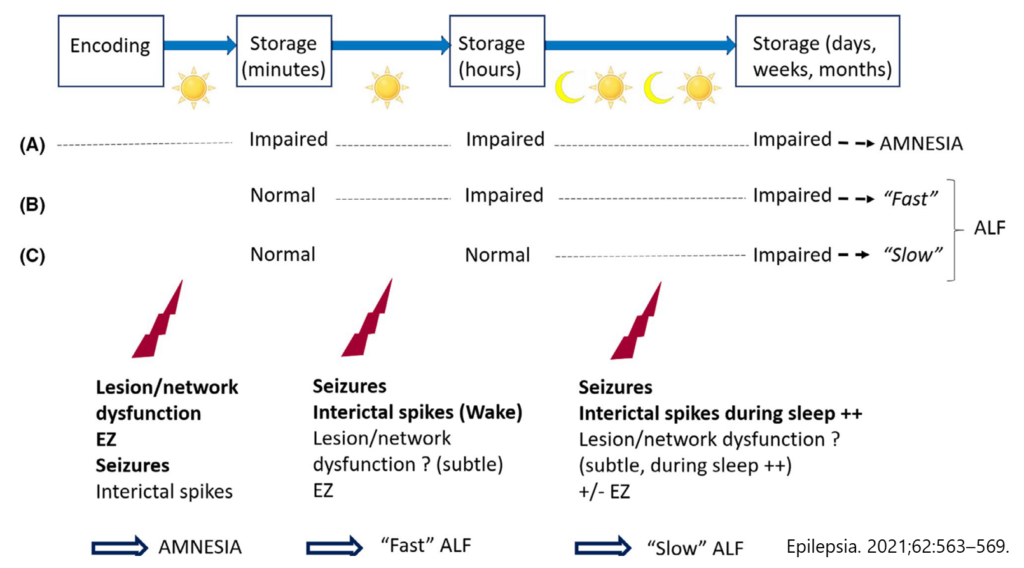

Accelerated long-term forgetting and autobiographical amnesia, which are invisible to standard memory tests, help to explain the discrepancy between normal test performance and prominent memory complaints among patients with epilepsy. Transient epileptic amnesia is an under-recognized but treatable cause of transient memory impairment. Further work is required to establish whether the interictal memory impairment is due to physiological or structural disturbance. The seizures respond promptly to treatment, whereas the interictal impairments generally persist. The seizure focus lies in the medial temporal lobes. It is associated with novel forms of interictal memory disturbance: accelerated long-term forgetting, remote memory impairment, especially affecting autobiographical memory, and topographical memory impairment. Transient epileptic amnesia is a distinctive syndrome of temporal lobe epilepsy principally affecting middle-aged people, giving rise to recurrent, brief attacks of amnesia, often occurring on waking. Recent research has established that this is indeed the case, and indicates that characteristic varieties of interictal memory disturbance co-occur with this form of epilepsy. In addition, some patients with TEA also notice an impaired ability to navigate around new and familiar routes called topographical amnesia.Case reports over the past 100 years have raised the possibility that epilepsy can manifest itself in episodes of amnesia. Results from our studies have also shown that TEA is associated with two particular types of memory difficulty between attacks:Īccelerated forgetting and Autobiographical amnesia Memory difficulties involve a mixture of anterograde and retrograde amnesia.Clinicians often make an incorrect initial diagnosis of the condition.Often associated with hallucinations of smell & involuntary movements (automatisms).The amnesic attacks are recurrent (average 12 per year).

The amnesic attack is brief (typically 30-60 minutes duration).The syndrome predominantly occurs in men (male to female ratio 2:1).Onset typically occurs in late-middle to old age (median 62 years).A clear response to anti-epileptic drugsīutler and colleagues recruited 50 patients with TEA using these diagnostic criteria in order to assess the clinical features of the syndrome.The experience of other common epileptic symptoms, such as, involuntary movements, hallucinations of smell or feeling a swirling sensation in your tummy.Cognitive functions besides memory remain intact (e.g.Recurrent witnessed episodes of amnesia.Distinguishing TEA from other causes of amnesic attacks is an important step in developing successful treatment programmes for this form of amnesia and its associated memory deficits.Ī diagnosis of TEA requires the following: TEA is often misdiagnosed as either transient global amnesia (TGA) or psychogenic amnesia. It has recently been recognised that transient amnesia can also be caused by epilepsy. There are a number of well recognised causes of transient amnesia, the most common probably being head injury, followed by transient global amnesia, migraine, drugs and rarely, transient ischemic attacks ("mini strokes"). " Transient amnesia" refers to repeated attacks of memory loss. Treatment Causes Description of a TEA Attack Info and Diagnosis


 0 kommentar(er)
0 kommentar(er)
